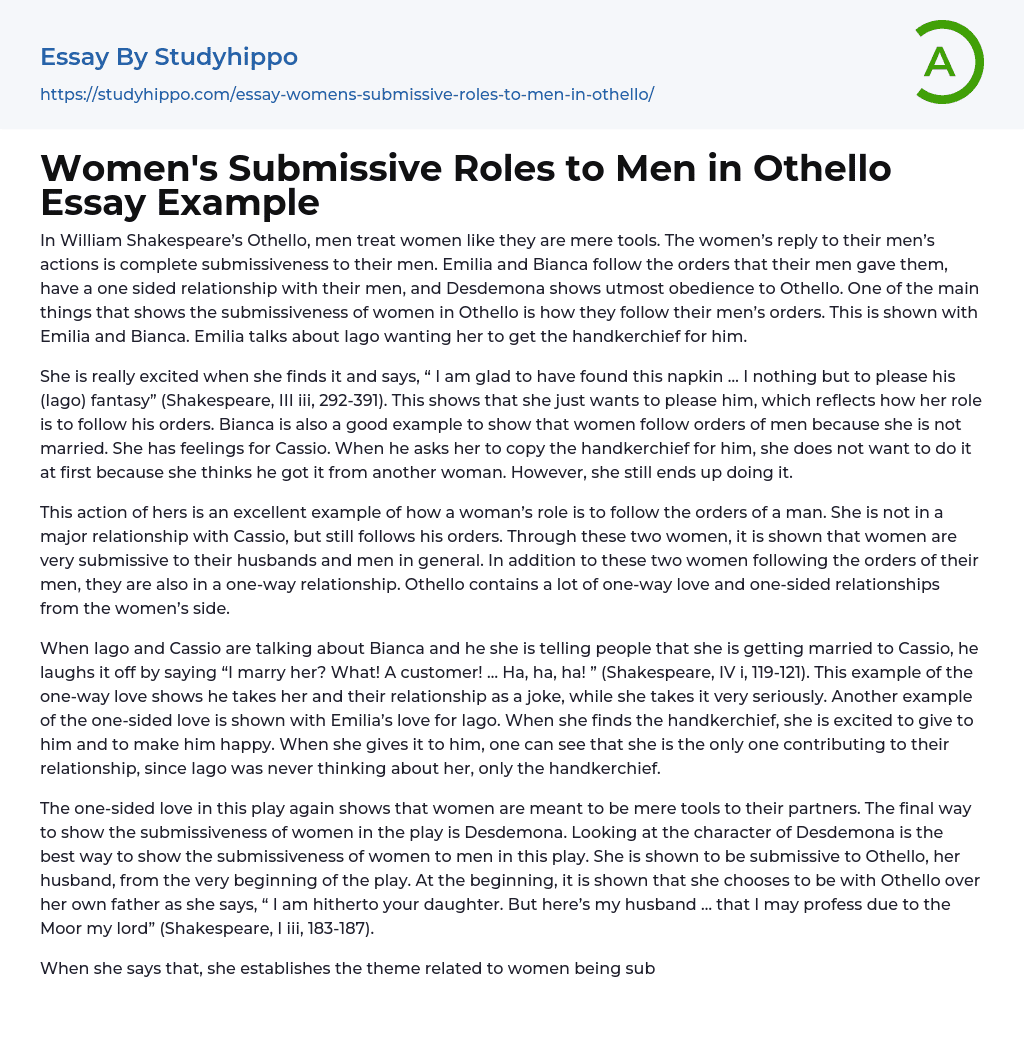In William Shakespeare’s Othello, men treat women like they are mere tools. The women’s reply to their men’s actions is complete submissiveness to their men. Emilia and Bianca follow the orders that their men gave them, have a one sided relationship with their men, and Desdemona shows utmost obedience to Othello. One of the main things that shows the submissiveness of women in Othello is how they follow their men’s orders. This is shown with Emilia and Bianca. Emilia talks about Iago wanting her to get the handkerchief for him.
She is really excited when she finds it and says, “ I am glad to have found this napkin … I nothing but to please his (Iago) fantasy” (Shakespeare, III iii, 292-391). This shows
...that she just wants to please him, which reflects how her role is to follow his orders. Bianca is also a good example to show that women follow orders of men because she is not married. She has feelings for Cassio. When he asks her to copy the handkerchief for him, she does not want to do it at first because she thinks he got it from another woman. However, she still ends up doing it.
This action of hers is an excellent example of how a woman’s role is to follow the orders of a man. She is not in a major relationship with Cassio, but still follows his orders. Through these two women, it is shown that women are very submissive to their husbands and men in general. In addition to these two women following the orders of their men, they are also in
one-way relationship. Othello contains a lot of one-way love and one-sided relationships from the women’s side.
When Iago and Cassio are talking about Bianca and he she is telling people that she is getting married to Cassio, he laughs it off by saying “I marry her? What! A customer! … Ha, ha, ha! ” (Shakespeare, IV i, 119-121). This example of the one-way love shows he takes her and their relationship as a joke, while she takes it very seriously. Another example of the one-sided love is shown with Emilia’s love for Iago. When she finds the handkerchief, she is excited to give to him and to make him happy. When she gives it to him, one can see that she is the only one contributing to their relationship, since Iago was never thinking about her, only the handkerchief.
The one-sided love in this play again shows that women are meant to be mere tools to their partners. The final way to show the submissiveness of women in the play is Desdemona. Looking at the character of Desdemona is the best way to show the submissiveness of women to men in this play. She is shown to be submissive to Othello, her husband, from the very beginning of the play. At the beginning, it is shown that she chooses to be with Othello over her own father as she says, “ I am hitherto your daughter. But here’s my husband … that I may profess due to the Moor my lord” (Shakespeare, I iii, 183-187).
When she says that, she establishes the theme related to women being submissive to their husbands and partners.
Desdemona continues to be submissive to Othello throughout the play and even when he is about to kill her. At the end, when Othello decides to kill her, she asks for more time but ends up letting him murder her. She continues to be faithful to him even when she comes back alive and replies to Emilia’s question of who has killed her by saying “ Nobody; I myself. Farewell” (Shakespeare, V ii, 125).
This ultimately shows that she has been submissive and loyal to her husband even after him killing her. Her loyalty to her husband shows that women in the play are submissive to men. The obedience of women to men, along with the one-sided love and Desdemona’s actions prove that women in Othello are submissive. These points show that women are weak compared to men and are therefore submissive to them. The actions of all these women establish the theme that women are weaker than men in the play. However, times have since changed and women are not regarded as weak beings anymore.
- Othello Jealousy essays
- A Doll's House essays
- A Midsummer Night's Dream essays
- A raisin in the sun essays
- A Streetcar Named Desire essays
- An Inspector Calls essays
- Death of a salesman essays
- Everyman essays
- Fences essays
- Hamlet essays
- Hedda Gabler essays
- Iago essays
- King Lear essays
- Macbeth essays
- Much ado about nothing essays
- Oedipus Rex essays
- Oedipus The King essays
- Othello essays
- Pygmalion essays
- Romeo And Juliet essays
- Tartuffe essays
- The glass menagerie essays
- The Importance of Being Earnest essays
- The Merchant Of Venice essays
- The Taming of The Shrew essays
- Twelfth Night essays
- Waiting For Godot essays




